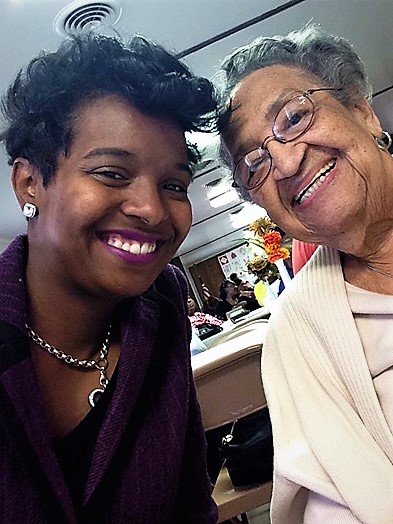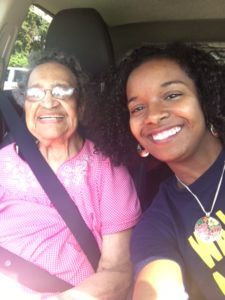
Our second caregiver profile for National Caregiver Month is of Adoria Maxberry of Cincinnati, Ohio. Adoria is the proud caregiver of her 98-year-old grandmother and came to our National Gathering in September through her involvement with the Amos Project. The Amos Project is a coalition of faith institutions in Cincinnati working to ensure all of our institutions are working for the success of everyone in the city. They were instrumental in passing Issue 5 in Hamilton County, which will strengthen families and communities by expanding services for seniors. (Our first profile of Heather Olgelsby is here.)

This is Adoria!
Adoria describes herself as an entrepreneur, but she’s an artist at heart. Indeed, the organization she owns and runs, Most OutGROWing LLC, is dedicated to creating and teaching art. She offers classes, creative consulting, creates murals, and creates commissioned works as well.
“I am passionate about helping others determine their passion, identify what makes their heart leap, and I love using art as a vehicle to help them grow or become “most outgrowing” in these ways”, she told Caring Across Generations’ National Membership Organizer Vanessa Faraj recently.
Adoria is passionate about helping people become best versions of themselves and it informs her approach to caregiving. Though relatively young, she already has extensive experience with care. Her first job was at a nursing home where she was able to provide care for her grandfather, who had Alzheimer’s. Now she’s in her first year of providing full-time care to her grandmother, who also has Alzheimer’s.
Adoria has had a strong connection with her grandmother all her life. “One of my many memories is that when I turned 16, Grandma gave me her car which I named after her. So whenever anyone took a ride in my car they knew the car’s name was an homage to my grandma.”
That connection plays out today in their daily interactions.
“I am her favorite grandchild. In fact, she told me so at the doctor’s recently! I am the one grandchild that sleeps in the bed with her when spending the night at her house. She wakes up frequently and tells me what she dreams about; she also care takes for me and constantly asks if I am hungry or need a sweater or more covers. She’s always so elated when I crawl beside her and points out that I’m the only one who will.”
But despite the intimacy and connection she gets from caring, Adoria, like all caregivers, is not immune to the stresses and challenges of taking on this responsibility.
“It is hard to manage my own family and balance being a wife, mother, business owner, and activist. I constantly juggle many things and wear many hats at once. I am constantly trying to find equilibrium and balance to not be exhausted. Everyone in my family needs to be loved and cared for equally, including me!”
Because she knows exactly what’s required of caregivers, she is at pains to make sure she acknowledges how difficult it can be and that other caregivers hear how much they matter.
“I also want to encourage other caregivers — it can be very tiring. Please do not get weary in what you are doing. If no one tells you this — thank you! Thank you from me. You are enough, you are appreciated, and you are whole. You are doing the right thing.”
Thanks are necessary but not sufficient.
For Adoria, thank yous, though necessary, aren’t sufficient in helping caregivers ensure that they are there for their families, no matter what. Elected officials play a role in setting the rules for how caregiving works and in investing in strong families and communities. We should not have to face the impossible choice of being there for our families or sacrificing our own economic security, retirement, and/or health. But millions of us make this decision every time we get sick or have a family member who needs care.
As she says, “Caregiving is not just a personal issue. It is a political issue that impacts all of us. I tend to stray from politics but I realized that the only way we are going to fix the system. Politicians need to know where we stand and understand our voice on this issue. Especially if they are to represent us adequately. Even politicians have mothers and fathers that need to be taken care of!”
You can read the entire interview below.
Can you tell me a bit about yourself – what work you do, what you are passionate about, what you value and believe in?
I am an entrepreneur; I own an arts organization called Most OutGROWing LLC, where I instruct painting classes/workshops, create murals, offer creative consulting and also create commissioned pieces. I stayed close to home during college so that I could care for my family. Before that, I worked at a nursing home as my first job to take care of my grandfather who had Alzheimer’s and am now in my first year of full-time care for my grandmother who also has Alzheimer’s. I am passionate about helping others determine their passion, identify what makes their heart leap, and I love using art as a vehicle to help them grow or become “most outgrowing” in these ways.
Who do you care for and how long have you cared for them?
Since May 2017, I have been taking care of my grandma full time. She lives by herself but we are always at her house. The only time we are not there is when her caregiver comes in the middle of the day during the weekday. I am her favorite grandchild. In fact, she told me so at the doctor’s recently! I am the one grandchild that sleeps in the bed with her when spending the night at her house. She wakes up frequently and tells me what she dreams about. She also care takes for me and constantly asks if I am hungry or need a sweater or more covers. She’s always so elated when I crawl beside her and points out that I’m the only one who will.
What were some of the joys and challenges you experience as a caregiver?
I love hearing my grandmother’s stories and I also love that she is always praying for us. I always hear her thanking God for us. Those little things remind me it is all worth it. One of my many memories is that when I turned 16, Grandma gave me her car which I named after her. So whenever anyone took a ride in my car they knew the car’s name was an homage to my grandma.
My grandma has Alzheimer’s so there are moments when she is just not herself. It is hard to manage my own family and balance being a wife, mother, business owner, and activist. I constantly juggle many things and wear many hats at once. I am constantly trying to find equilibrium and balance to not be exhausted. Everyone in my family needs to be loved and cared for equally, including me! It is a challenge to make sure my husband and children don’t have to worry about getting affection and get the attention they need. I try my best to maintain my sense of self and connect with what brings me joy. Not to mention maintaining my sanity.
Why did you attend the field gathering and how did you benefit from your experience there? What kinds of people did you meet and what did you learn?
Bianca Edwards at the AMOS Project invited me to attend the National Gathering. We have a vote on a senior services levy coming up and I wanted to be adequately equipped to talk about the issue of long term care. To be able to attend a gathering that speaks to my area of the fight was huge. Connecting with other family caregivers and hearing about their stressors, frustrations, joys, pain, and concerns was deeply meaningful for me. Understanding family caregiving as a political issue helped me better understand the importance of getting and staying involved in this fight.
Caregiving is not just a personal issue. It is a political issue that impacts all of us. I tend to stray from politics but I realized that the only way we are going to fix the system. Politicians need to know where we stand and understand our voice on this issue. Especially if they are to represent us adequately. Even politicians have mothers and fathers that need to be taken care of!
My faith in God always makes everything possible. I believe that my strength to make it is truly drawn from my relationship with Jesus.
I also want to encourage other caregivers — it can be very tiring. Please do not get weary in what you are doing. If no one tells you this — thank you! Thank you from me. You are enough, you are appreciated, and you are whole. You are doing the right thing. Encourage other caregivers because it can get very tiring. If no one else tells you that — you are appreciated and loved. You are enough. You are whole. Again, you are doing the right thing; it is enough.
A lot of times it is easy for caregivers to forsake themselves. You are offering care for everyone else but who is caring for you? You can’t take a sick day. Caregivers are usually wearing all the hats. They may never hear these things or a thank you. It can come from someone who understands where they are. If I don’t tell them, who will?
We all know that being there for our families is non-negotiable. And we know that family caregivers will do whatever it takes to ensure their loved ones get care. This November, which is National Caregiver Month, we are honoring all the hard work caregivers do, in good times and bad, by sharing profiles of family caregivers from the Caring Across Generations activist network.
Sharing our experiences is a powerful way to break through the isolation that so many caregivers feel and connect with the millions of other people doing this work every day. (There are about 40 million family caregivers in the United States!) That’s why we would love to hear from YOU!
Do you have a care experience that has altered the course of your life? Is there anything in this and the other profiles that speaks to you? Do you see yourself, your feelings, or your own experiences? If so, what is it?
You can leave a comment or you can send an email to our National Membership Organizer, Vanessa Faraj, vanessa@caringacross.org
###